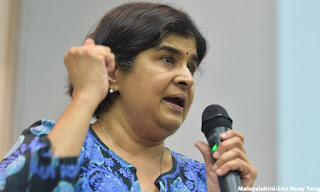Attorney-general Mohamed Apandi Ali must explain the reason for ignoring concerns raised by the rulers over the National Security Council (NSC) Bill, said a coalition of NGOs.
This was after the legislation was gazetted as law on Tuesday without royal assent.
"The attorney-general had confirmed there were no amendments to the bill despite promising scrutiny of some provisions after his meeting with the rulers in February.
"It is now incumbent on the attorney-general to disclose if any provisions were scrutinised at all and the reasons why no amendments were made nevertheless," said #TakNakDiktator representative Ambiga Sreenevasan in a media statement today.
On Feb 17, the Conference of Rulers asked that the NSC Bill, which would give the National Security Council headed by the prime minister emergency-like powers, to be refined.
However, according to the national gazette, the NSC Bill was automatically assented the following day on Feb 18 under Article 66(4A) of the Federal Constitution.
The provision granted automatic assent to any legislation if the Yang di-Pertuan Agong does not provide his assent within 30 days from when the legislation is presented to him.
"Whilst this is constitutionally permissible, serious questions arise as to why the government acted so hastily and in defiance of the concerns raised by the Conference of Rulers particularly as the bill directly impinges on the powers of the Yang di-Pertuan Agong.
"More so, as they have acted in complete disregard of the valid concerns raised by the public with regard to the ramifications of this act," said Ambiga.
'A leap towards dictatorship'
Ambiga said Putrajaya's move to ignore the Conference of Rulers' concerns should trigger alarm bells.
"In this exercise, this government has behaved as if they are accountable to no one, neither the rulers nor the people.
"The fact that there were no amendments to the bill is proof of this. If this is not a dictatorship, then what is?" she said.
She warned that the NSC Act represented an extremely dangerous step for Malaysia as it concentrated extraordinary powers in the hands of the prime minister and NSC.
"No person or entity should have such absolute and unfettered powers. Concentration of power leads to abuse, particularly in times of political crisis.
"The NSC law represents a leap towards a dictatorship and a military-police state with little or no safeguards," she said.
She added that the law was unconstitutional and a grave abuse of power.
"Malaysia does not need such a law which goes against all principles of democracy and undermines the rule of law in the country," she said.
The #TakNakDiktator coalition comprises Amnesty International Malaysia, Bersih, Centre to Combat Corruption and Cronyism, National Human Rights Society, Pertubuhan Ikram Malaysia (Ikram), Institut Rakyat, Lawyers for Liberty, Society for the Promotion of Human Rights and Suaram.
This was after the legislation was gazetted as law on Tuesday without royal assent.
"The attorney-general had confirmed there were no amendments to the bill despite promising scrutiny of some provisions after his meeting with the rulers in February.
"It is now incumbent on the attorney-general to disclose if any provisions were scrutinised at all and the reasons why no amendments were made nevertheless," said #TakNakDiktator representative Ambiga Sreenevasan in a media statement today.
On Feb 17, the Conference of Rulers asked that the NSC Bill, which would give the National Security Council headed by the prime minister emergency-like powers, to be refined.
However, according to the national gazette, the NSC Bill was automatically assented the following day on Feb 18 under Article 66(4A) of the Federal Constitution.
The provision granted automatic assent to any legislation if the Yang di-Pertuan Agong does not provide his assent within 30 days from when the legislation is presented to him.
"Whilst this is constitutionally permissible, serious questions arise as to why the government acted so hastily and in defiance of the concerns raised by the Conference of Rulers particularly as the bill directly impinges on the powers of the Yang di-Pertuan Agong.
"More so, as they have acted in complete disregard of the valid concerns raised by the public with regard to the ramifications of this act," said Ambiga.
'A leap towards dictatorship'
Ambiga said Putrajaya's move to ignore the Conference of Rulers' concerns should trigger alarm bells.
"In this exercise, this government has behaved as if they are accountable to no one, neither the rulers nor the people.
"The fact that there were no amendments to the bill is proof of this. If this is not a dictatorship, then what is?" she said.
She warned that the NSC Act represented an extremely dangerous step for Malaysia as it concentrated extraordinary powers in the hands of the prime minister and NSC.
"No person or entity should have such absolute and unfettered powers. Concentration of power leads to abuse, particularly in times of political crisis.
"The NSC law represents a leap towards a dictatorship and a military-police state with little or no safeguards," she said.
She added that the law was unconstitutional and a grave abuse of power.
"Malaysia does not need such a law which goes against all principles of democracy and undermines the rule of law in the country," she said.
The #TakNakDiktator coalition comprises Amnesty International Malaysia, Bersih, Centre to Combat Corruption and Cronyism, National Human Rights Society, Pertubuhan Ikram Malaysia (Ikram), Institut Rakyat, Lawyers for Liberty, Society for the Promotion of Human Rights and Suaram.
















